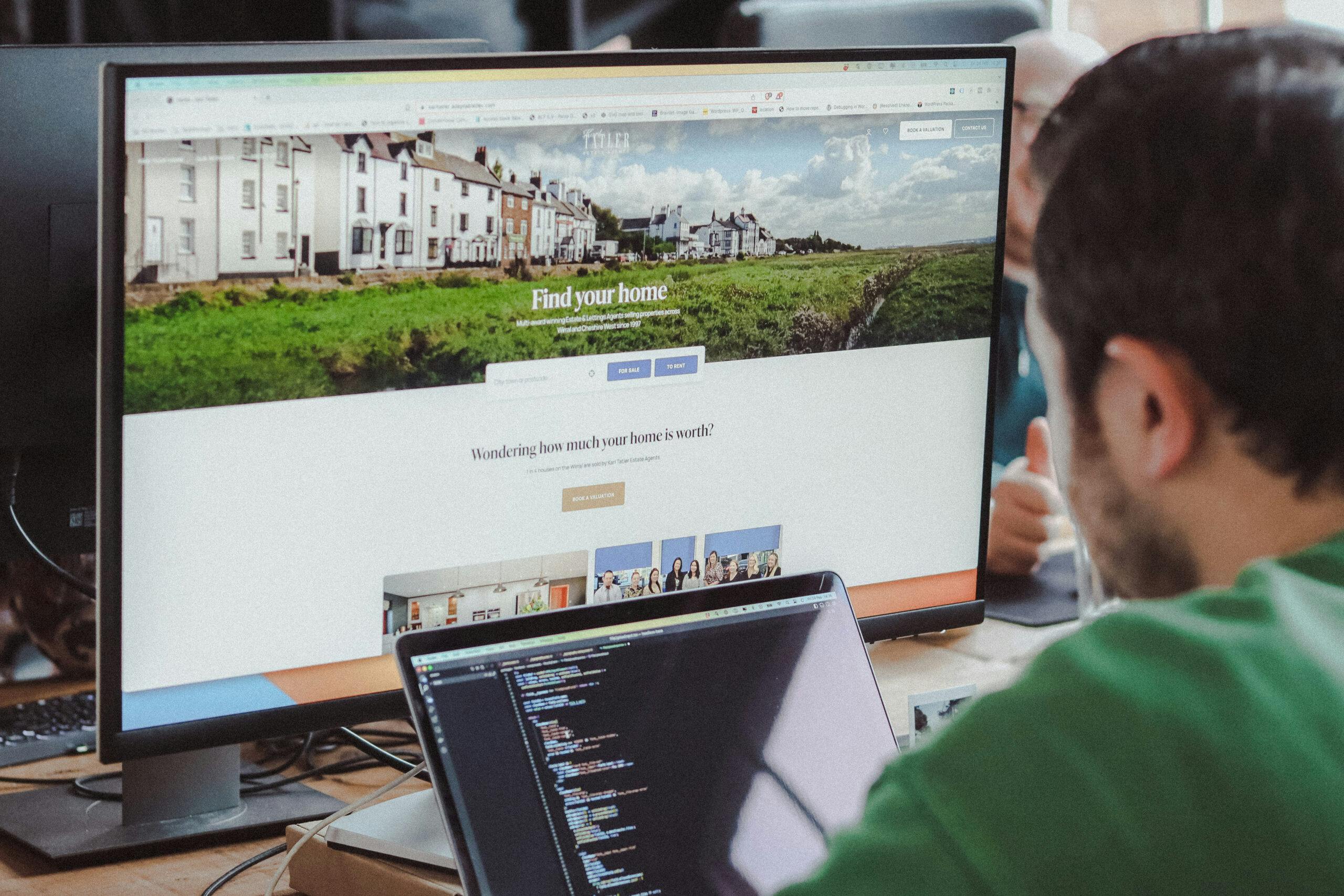A quick guide to Enterprise WordPress

According to the latest data, WordPress powers 62.8% of websites with a content management system (CMS) – which is 43.2% of all websites. This makes it by some margin the most popular CMS in the world. Not only that, but WordPress is used for a wide variety of applications – from personal blogs to powering some of the websites of household names, including Bloomberg, The Times, and Channel 4.
Due to its roots as a personal blogging platform, many people who work with WordPress have had to try and shake off the image that it’s essentially an off-the-shelf tool for small projects and small organisations just looking to get a quick website off the ground.
But we’ve been working with WordPress as a CMS for over a decade – and it sits behind the majority of our projects, which are all bespoke websites for enterprise-level organisations, including everything from donations experiences and booking systems to property search and multi-sites.
In this quick guide, we’ll look at Enterprise WordPress as a solution and why it’s such a powerful tool. Read on to find out:
- What do we mean by “Enterprise WordPress”?
- What makes WordPress suitable for enterprise?
- Should you use WordPress for your website?
What is enterprise WordPress?
Enterprise WordPress is essentially a version of the WordPress CMS which can be used at enterprise level. Because it’s open-source, “standard” WordPress can be customised and enhanced to create a more scalable and powerful platform suitable for use on larger projects. Outside of the platform itself, Enterprise WordPress solutions (such as ours) are usually deployed in an environment with tools for scalability, security and integrations that enhance its stability and capabilities as a business tool.
Our Enterprise WordPress solution also utilises a customised editing experience, making adding and managing content as easy as possible for clients. We actually strip back some of the out-of-the-box functionality to prevent bloat and utilise design systems consisting of flexible components and reusable blocks. The editing experience is “locked down” enough to ensure the brand is applied consistently and page templates aren’t broken, but the flexible components give users the tools they need to create pages and content as and when they need to.
What makes WordPress suitable for enterprise?
Familiarity and ease of use
As WordPress is the most popular CMS in the world, it stands to reason that most people who work with and manage websites will be quite familiar with it. We find that a lot of clients who approach us about a new website project are already using WordPress, so for the sake of continuity and to ensure an easy transition, it makes sense to continue using it (provided it’s the right solution for their requirements – more on that shortly). It also offers one of the simpler editing experiences for users out of the CMS platforms on the market. Ease of use and manageability for our clients is key – if it doesn’t enhance their ability to promote their organisation and improve their processes, then the project hasn’t been a success.
Flexibility
As we’ve already touched on, the fact that WordPress is open-source makes the base system itself very customisable. You’re not locked into the software’s roadmap, as you might be with other enterprise-level solutions. You can essentially create your own WordPress roadmap – so you can build and add new features and expand on the platform whenever you need to. In addition to this, there are around 60,000 free plugins in the WordPress library, and many more premium solutions suitable for enterprise applications. These add-ons and enhancements help to bring another level of customisation and flexibility to WordPress, provided only the best and most trusted plugins are used. An expert partner like Adaptable will help you select and deploy the right plugins and add-ons for enterprise WordPress – we can even develop bespoke plugins too.
Security
If managed incorrectly, WordPress, like any web-based platform, can be vulnerable to security threats. But the nature of WordPress and its manageability mean it’s possible to deploy it in a very secure environment which can be closely monitored and protected. Also, because it’s open-source and so widely used, there is a massive community of support and knowledge available, so any plugin or theme vulnerabilities are very quickly reported and can be dealt with, with minimal disruption. WordPress core is managed by a world-class security team that stays on top of vulnerabilities and releases regular patches and updates to keep it secure. Having a trusted partner like Adaptable with purpose-built secure solutions and ongoing support and maintenance will help to ensure enterprise WordPress is as secure as possible.
Cost-effectiveness
Even at enterprise level, where you might have a bit more scope in terms of budget, you still want to make sure your website project is as cost-effective as possible. With WordPress, there are no licensing fees, so even with design/engineering costs, it’s usually a more cost-effective solution than other platforms based on what you get at the end. And you’re also not locked into an ongoing spend on the platform, so this ongoing spend can be put towards support, maintenance, and tools that will enhance your site and your WordPress experience.
Is WordPress right for your enterprise-level project?
Despite its many benefits and capabilities to be used for a variety of applications for small, medium and large organisations, WordPress isn’t right for every single project. Ultimately, it benefits you to not necessarily be prescriptive on which CMS platform you want to use, unless there’s a specific and very compelling reason to do so. This can limit the scope of your project and the options available to you. Picking the right expert partner who is open to and experienced with a range of solutions, like Adaptable, will help you to get access to the expertise and knowledge of all of the possible solutions and which one will be right for you and your organisation. We assess the needs of our clients and the objectives of each project, explore all of the possible technical solutions and use this insight to determine whether or not WordPress is the right way to go.
Some more FAQs
If you’re still pondering the ins and outs of enterprise WordPress and whether it might be an option for you and your project, here are a few quickfire answers to some more questions we’re frequently asked about WordPress.
What is headless WordPress?
Headless WordPress is a way of setting up a WordPress site where the frontend (what the user sees and interacts with) is separated from the backend CMS platform (where you edit and manage content). In a “traditional” setup, you have a WordPress theme written in the scripting language PHP, which is called upon to deliver content to the user interface whenever a page is load. In a headless WordPress setup, this frontend interface is detached, or decoupled, from the backend, and content is pulled as data from the backend via an API. This gives you flexibility and freedom to use whichever frontend framework you like to build your user interface, while still having the stability, flexibility and familiarity of WordPress in the background.
Can WordPress support multiple sites?
Yes it can. One of the reasons why WordPress is so good at enterprise level is that it offers multi-site capabilities. With a multi-site installation, you can manage multiple sites from the same WordPress instance. This can streamline your ecosystem and make everything easier to manage from one place. It can also be useful if you need to serve your site or versions of your site in different languages to target multiple geographies.
What are some alternatives to Enterprise WordPress?
As we’ve said, enterprise WordPress isn’t right for every project. Depending on your use case and your needs, there are a wide range of solutions which might work better for you. From a headless perspective, we’ve worked on projects using platforms like Sanity and Adobe Experience Manager. In the example of Sanity, it was selected because it could better handle the high level of complexity in the data we needed to manage. Adobe Experience Manager was selected for that particular project because it fitted seamlessly into the organisation’s processes and their heavy reliance on the Adobe suite. Ultimately, selecting the right platform to support you and your needs is more important than the technology itself.
Key takeaways
- Enterprise WordPress is an enhanced, customised version of the WordPress platform, packaged with other technologies and tools, that makes a scalable and stable website experience suitable for enterprise
- WordPress offers familiarity, ease of use, flexibility, security and cost-effectiveness for enterprise-level projects
- WordPress has many benefits but isn’t right for every project – it’s important to work with a partner who has knowledge and experience with a wide range of solutions and can recommend the right one for you
Considering an enterprise-level website project and wondering whether WordPress might be right for you? Get in touch and we can figure out the best route forward together.




